Daniel Hopsicker
This will someday be remembered as the year when shocking new discoveries about the National Security Agency became an almost daily occurrence. But amid the steady drumbeat of revelations, the one I’ve been waiting for hasn’t yet surfaced:
The NSA’s involvement in the global drug trade.
Surprised? So was I, at first. But the NSA does a lot more than just signals intelligence. More than a decade ago, long before the current brouhaha, I heard credible allegations about an NSA role in the cocaine trade in Bolivia, from someone who was there. What I know of the NSA’s links to drug trafficking requires a brief excursion back to the year 2000. More on that in a moment.
Today the NSA is mapping American’s social networks, using cell-phone geo-location to track their movements , cracking the encryption guarding their bank accounts, medical records, e-mails, Web searches, Internet chats and phone calls.
Just this week we learned that the NSA spied on everyone from Mohammed Ali to Martin Luther King to Republican Senator Howard Baker during the Vietnam War.
The NSA’s new Utah Data Center is already up and running, and they didn’t even announce it. No big "Grand Opening" sign outside, no balloons, no parade, no open house… and no sense of humor.
Art Buchwald, Enemy of the State.
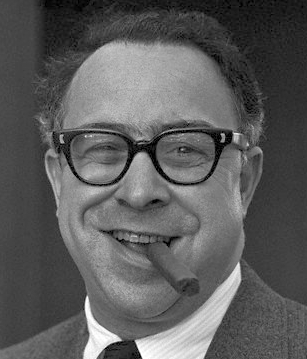 Here's two horrific facts about the NSA: The Surveillance State is menacing our basic political liberties. Equally important: they have no sense of humor.
Here's two horrific facts about the NSA: The Surveillance State is menacing our basic political liberties. Equally important: they have no sense of humor.
The most revealing single nugget of information about the NSA which has come to light, to me, is the recent discovery that they even spied on humorist Art Buchwald. Many won’t remember him–Buchwald is dead, and from another era—but he was utterly harmless. Even his humor was gentle.
So how did he became a ‘person of interest’ to the NSA?
The answer tells you everything you need to know about why the NSA today represents a clear and present danger to the Republic. At the time (1967) someone had figured out that the Vietnam War was costing the Pentagon $300,000 per enemy combatant killed.
Buchwald wrote a column suggesting the US should offer any Viet Cong who defect to our side a new house in the US, a new car, a color television set and a paid-up country-club membership. We’d still be saving money, he figured, not to mention creating jobs right here in the US.
Running Bolivia for the NSA
“Spying is spying. You have to make up your mind that you are going to have an intelligence agency, protect it as such, and shut your eyes and take what is coming.” Senator John Stennis, Democrat from Mississippi.
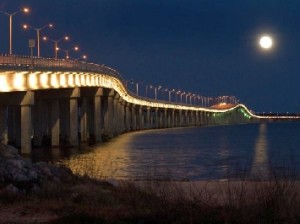 It’s the year 2000. In the middle of a mild winter in Bay St. Louis, Mississippi, home to the John C. Stennis Space Center, a NASA rocket testing facility, on the banks of the Pearl River that forms the boundary between Mississippi and Louisiana, fifty miles east along the Gulf Coast from New Orleans. I’m there doing research for my book, “Barry & the Boys.”
It’s the year 2000. In the middle of a mild winter in Bay St. Louis, Mississippi, home to the John C. Stennis Space Center, a NASA rocket testing facility, on the banks of the Pearl River that forms the boundary between Mississippi and Louisiana, fifty miles east along the Gulf Coast from New Orleans. I’m there doing research for my book, “Barry & the Boys.”
At the invitation of a retired US Customs Agent, I’m At Dan B’s, a popular local bar and restaurant on a waterfront crowded with yachts and shipbuilders, to meet a man who knew and worked for more than a decade in Central and South America with life-long CIA pilot and famous American drug smuggler Adler Berriman “Barry” Seal.
With a touch of awe in his voice, the Customs Agent told me the man I’m there to meet was such a “big dog” during the ‘80’s that the US Customs Service had a 17-man squad (he was on it) assigned to do nothing but track every movement he made, both inside and outside of the U.S.
He had been running Bolivia for the NSA, the Customs Agent said, while Barry Seal was flying round-trips to South America on military cargo planes loaded with weapons and cocaine. American intelligence is a competitive world. So, of course, U.S. Customs was intrigued.
A visitor and a warning
He moves across the room with a quiet sense of power that belies his smallish frame. He has the kind of erect former military bearing that becomes increasingly recognizable as you approach Mobile, Alabama, where they seem to congregate in the winter.
When we met, he requested anonymity. It was, he said, ‘mission critical.’
One reason for his reluctance to use his real name became clear with the first words out of his mouth. “The day after we first met, something happened,” he said with obvious annoyance.
“I got a visit from a well-known man I haven’t seen for a half-dozen years. He warned me against talking with you. Then he asked me if I had everything I need.
“‘Got enough money, Russ? Need anything?’" He shrugged.
So in “Barry & ‘the boys’” I called him “Gus.” But a few years ago he passed away. So there’s no harm now in using his real name.
His name was Russ Eakin.
In the here and now
"We are here," said muckraking American journalist H. L. Mencken, "and it is now. Further than that all human knowledge is moonshine.”
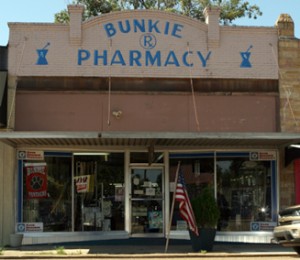 While this story is not about Russ Eakin, a sense of who he was may be important in understanding what comes next. Also, he was such a picture-perfect example of the type of American, for better and worse, who strode the continents of Earth during the American Century.
While this story is not about Russ Eakin, a sense of who he was may be important in understanding what comes next. Also, he was such a picture-perfect example of the type of American, for better and worse, who strode the continents of Earth during the American Century.
Russ Eakin was born in Bay St Louis in 1944 and raised in the small town of Bunkie, Louisiana (pop 5000), which bills itself, perhaps over-enthusiastically, as the “Best Spot Topside on God’s Green Earth!”
My first question to him was how had he become a spook.
“I was asked if I was interested in taking a trip to Honduras in the summer of 1964,” he replied. “I learned Spanish quickly, in two weeks, and loved the culture. And I ended up living in Central and South America and working for two different factions of the U.S. Government: Customs and NSA.”
Two weeks seems an incredibly short time to learn a language. Then I learned of his family’s record of achievement. His mother, one of Louisiana’s most celebrated historians, edited a scholarly edition of “Twelve Years a Slave,” the autobiographical memoir of a free black man who was kidnapped into slavery in 1841, working on plantations in Louisiana for 12 years before his release.
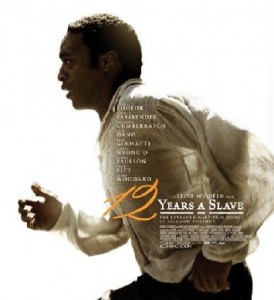 The book, considered “the best firsthand account of slave life in existence,” was turned into a movie starring Brad Pitt, and is being released this month.
The book, considered “the best firsthand account of slave life in existence,” was turned into a movie starring Brad Pitt, and is being released this month.
His father, according to his obituary in the Feb 8, 1995 Alexandria Daily Town Talk, was a newspaper publisher who graduated magna cum laude from Louisiana State University. Among the children he left behind was “Russell Eakin of Mexico City, Mexico and Mandeville, LA.”
A job is a job is a job
“If they can get you to ask the wrong questions, they don’t have to worry about the answers.” Thomas Pynchon
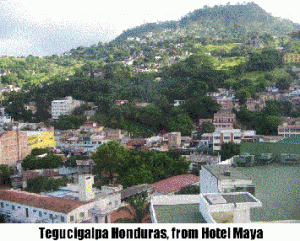 “I first met Barry Seal in the lobby of the Hotel Maya in Tegucigalpa, Honduras, back in the mid-70’s,” he told me. “Barry was good friends with the owners of the hotel, which was the center of intrigue in Central America back then.”
“I first met Barry Seal in the lobby of the Hotel Maya in Tegucigalpa, Honduras, back in the mid-70’s,” he told me. “Barry was good friends with the owners of the hotel, which was the center of intrigue in Central America back then.”
“And just by looking at each other, we both knew what the other was doing, although neither of us stated it openly. It was just…understood. Besides, what we were doing wasn't as important as the fun we were having doing it. We were—both of us—making more money than we knew what to do with, and having a great old time.”
“What did you do down there?” I asked.
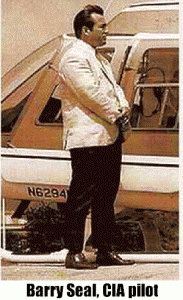 “My job was to corrupt the governments of Central America,” he stated crisply. “And I was so good at it I didn’t come back for 17 years.”
“My job was to corrupt the governments of Central America,” he stated crisply. “And I was so good at it I didn’t come back for 17 years.”
“I was working for NSA. I owned two arms manufacturing plants in Bolivia. They were set up through the Catholic Church. I worked out daily with (Bolivian) President Bandar. We built SM-90 machine guns.”
“We manufactured 5000 machine guns a day, using computer-driven lathes from Rockwell International. Each one cost us 35 bucks. And we’d sell ‘em for $1200 apiece.”
“We field-tested them against the Israelis, who had designs on the biz but could never get their foot in the door, because they were so mistrusted. Row after row of Bolivian Generals in tents, our weapons against the Israelis, and we won.”
The Great Cocaine Coup
“Garcia-Meza brought in the neo-fascist paramilitary squads with the swastika armbands. They called themselves the ‘Fiancées of death.’ He put the Interior Ministry under the nephew of Roberto Suarez, the self-styled King of Cocaine.”
“I knew Roberto Suarez very well,” Eakin said quietly. “I was married to one of the Suarez’s.”
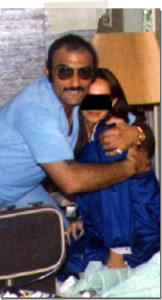 Eakin also knew Sonia Atala, the other well-known drug figure in Bolivia at the time. Known as the “queen of the cocaine business," she may be the most important figure of the Iran Contra era to avoid wide exposure.
Eakin also knew Sonia Atala, the other well-known drug figure in Bolivia at the time. Known as the “queen of the cocaine business," she may be the most important figure of the Iran Contra era to avoid wide exposure.
“Sonia ran the cocaine biz in Bolivia,” said Eakin. “And that was where the business was run from. The guys you heard about—the Ochoa’s and the Escobar’s and the Lehder's—they were just Vice Presidents fronting for the company.”
“And Barry Seal worked directly for Sonia.”
Things take a turn for the worse
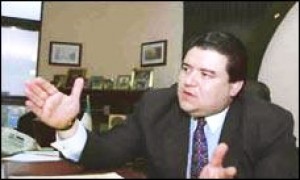 It was right about then that I pissed off Russ Eakin. I’d had a drink or two by then, and must have wanted to impress him with my knowledge of the drug business, a ridiculous thought, because peeking in through the window from outside is no substitute for being there.
It was right about then that I pissed off Russ Eakin. I’d had a drink or two by then, and must have wanted to impress him with my knowledge of the drug business, a ridiculous thought, because peeking in through the window from outside is no substitute for being there.
Plus by that point in my investigation I’d lost interest in romantic tales of drug pilot daring do. Skimming ten feet over the surging waves of the Gulf of Mexico on a 'dangerous' drug run. Looking over your shoulder all the way.
But tracing the money back up the line–now there was an endeavor promising real adventure.
I tried to make my voice as casual as possible. “So, ah, Russ, what can you tell me about Bernardo Dominguez?”
I was unprepared for the vehemence of his response. There was instant silence. Then a glare.
“How do you know about Bernardo Dominguez?” he demanded. He didn’t bother to wait for a reply.
“Listen,” he told me. “I agreed to talk to you about Barry Seal, who died 20 years ago. And now you’re asking about Bernardo Dominguez. I don’t know if I can talk to you anymore.”
“I was only asking a question,” I said lamely. “I don’t know what I did wrong.”
“Don’t you know what you’re doing? Just by asking? You’re threatening to compromise current operations. And that can get you in real trouble.”
"Threatening to compromise current operations'
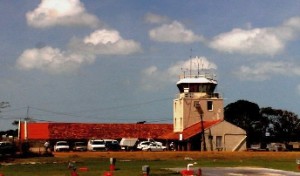 We’ll come back to Russ Eakin. He didn’t stay mad long. But he never said a word about Bernardo Dominguez, or even mentioned him, and neither did I. There were plenty of other topics I wanted to know about.
We’ll come back to Russ Eakin. He didn’t stay mad long. But he never said a word about Bernardo Dominguez, or even mentioned him, and neither did I. There were plenty of other topics I wanted to know about.
And we'll return to Bernardo Dominguez, and explain his links to Barry Seal, andhis links to, incredibly, the crew running the Venice Airport today, and how he represents the corporatization of drug trafficking.
You’ve got to look closely at the information they’re giving out. And then look even closer at what they’re leaving out.
Here's an example: A control tower employee in Ciudad del Carmen, the airport where the DSC-9 landed, causing something of a fuss, told authorities at a crucial juncture in what was an extremely tense situation, as the American-registered DC-9 carrying 5.5 tons of cocaine circled and requested permission to land, she was approached inside the airport terminal by an American she'd never seen before.
She described him as being 40 years old, with blond hair and a deep tan, and he was wearing a green polo shirt. The American, she said, hadn’t just wanted officials in the airport to let the plane land. He wanted the tower to certify the flight, meaning the DC-9 could then continue its journey, as a domestic flight, which would not need to clear Mexican Customs.
Its in. Passed ‘go.’ Pop the champagne.
Make sure everybody brought cash.
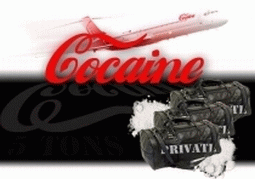 Said green polo shirt-wearing American remains unidentified. He just disappeared from narratives of the event… except for one respected journalist at Mexican newspaper Proceso, who wisely picked up on this detail, followed up, and then reported that among the contingent of drug traffickers awaiting the arrival of the plane on the ground with as much nonchalance as they could muster…the American had been in charge.
Said green polo shirt-wearing American remains unidentified. He just disappeared from narratives of the event… except for one respected journalist at Mexican newspaper Proceso, who wisely picked up on this detail, followed up, and then reported that among the contingent of drug traffickers awaiting the arrival of the plane on the ground with as much nonchalance as they could muster…the American had been in charge.
It’s not outlaws who run the drug trafficking industry. It’s the parasitic rich. The deviant elite. The bankers. There’s even a link in our story to Goldman Sachs.
In every country in the world in which drugs are present, and illegal, control of the drug trade is the most important tool in perpetuating that country’s oligarchy, more important than a police force with a billion Billy clubs.
Profits from the drug business can purchase a billion Billy clubs and have enough change left over to meet the needs of venture capital (cf: the British Empire).
The guys chopping off heads in Mexico while wearing bandoliers strapped across their bare chests are barely into middle management.
And the guys whose names you read in newspapers, where they're identified as bosses, jefes, and kingpins...
They’re not the guys that get the best girls.

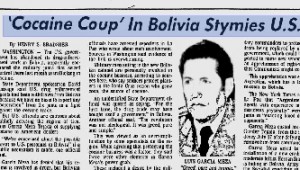
No hay comentarios:
Publicar un comentario